现代大学英语精读5 课文翻译unit1,2,4,5,7复习进程
大学英语精读第五册课文翻译
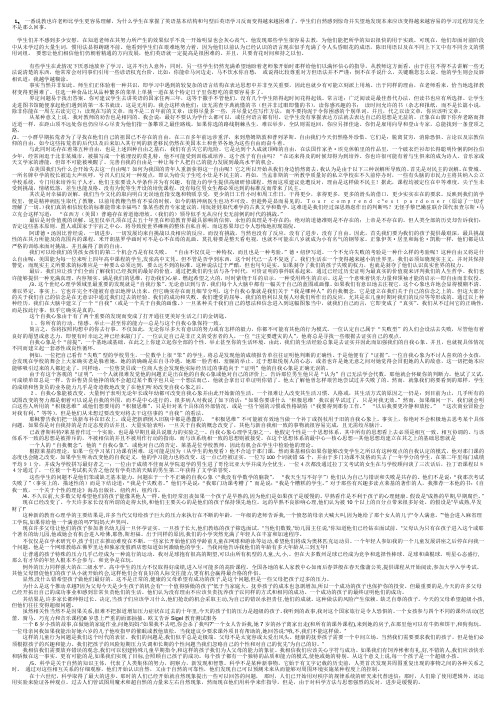
1、一番说教也许老师比学生更容易理解,为什么学生在掌握了英语基本结构和句型后英语学习反而变得越来越困难了。
学生们自然感到惊奇并失望地发现本来应该变得越来越容易的学习过程却完全不是那么回事。
学生们并不感到多少安慰,在知道老师在其努力所产生的效果似乎不及一开始明显也会灰心丧气。
他发现那些学生很容易去教,为他们能把所学的知识很快的用于实践。
可现在,他们却面对前阶段中从未学过的大量生词,惯用法显得踌躇不前。
他看到学生们在艰难地努力着,因为他们以前认为已经认识的语言现在似乎充满了令人头昏眼花的成语,陈旧用语以及在不同上下文中有不同含义的惯用词组。
要想让他们相信他们仍朝着精通的方向发展,他们英语就一定提高是很困难的。
并且,只要肯花时间和持之以恒。
有些学生在此情况下厌恶地放弃了学习,这并不出人意外;同时,另一些学生仍然充满希望地盼着老师象开始时那样给他们以满怀信心的指导。
从教师这方面看,由于往往不得不去讲解一些无法说清楚的东西,他常常会对同事们引用一些谚语权充台阶,比如:你能牵马河边走,马不饮水你自愁,或说得比较尊重对方但语法并不严谨:倒不在乎说什么,关键瞧您怎么说。
他的学生则会反唇相讥道:我越学越糊涂。
事实当然并非如此。
师生们正体验着一种共识,即学习中遇到的较复杂的语言结构在表达思想中并非至关重要,因此也就少有可能立刻派上用场。
出于同样的理由,在老师看来,恰当地选择教材变得更困难了。
任选一种食品比从品种繁多的菜单上单挑一道在某个特定日子里你想吃的菜要容易多了。
界定问题易于找出答案。
你可建议学生去讲英语的国家住两三年,这等于撒手不管他们。
没有几个学生陪得起时间花得起钱。
常言道:广泛阅读是最佳替代办法,但读书也应有所选择。
让学生走进图书馆随便拿起他们遇到的第一本书就读,这是无用的。
我会这样劝他们;读无需查字典就懂的书(但并非过眼即懂的书),读你感兴趣的书;读时间允许的书(杂志和报纸,而不是长篇小说,除非你能在一周左右读完它);读现在写的文章,而不是二百年前的文章;读得尽量多一些,并尽量记住写作方法,而不要拘泥于令你困惑的个别单词。
大学英语精读第5册1-5课文全文翻译
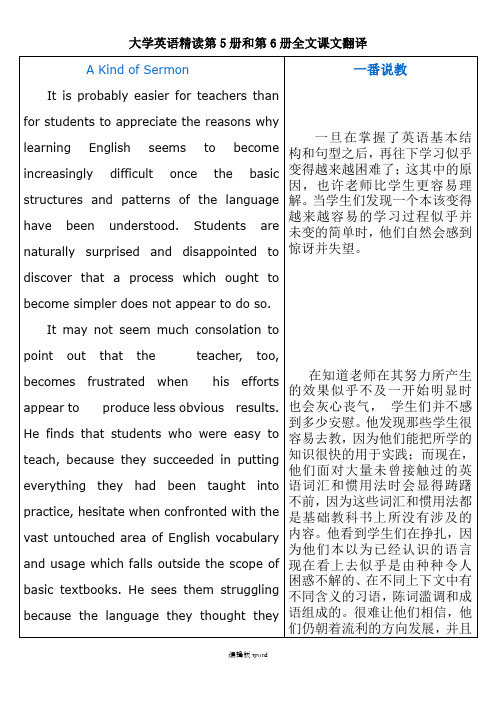
大学英语精读第5册和第6册全文课文翻译
A Kind of rmon
It is probably easier for teachers than for students to appreciate the reasons why learning English seems to become increasingly difficult once the basic structures and patterns of the language have been understood. Students are naturally surprised and disappointed to discover that a process which ought to become simpler does not appear to do so.
大学英语精读第5册1-5课文全文翻译
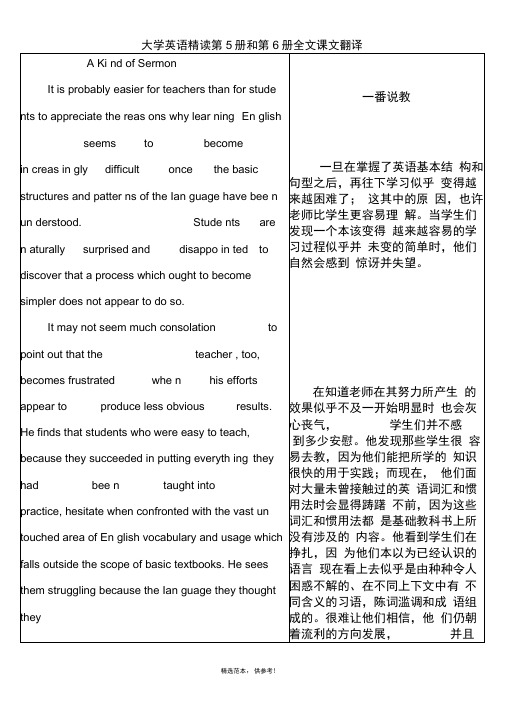
大学英语精读第5册和第6册全文课文翻译A Ki nd of SermonIt is probably easier for teachers than for stude nts to appreciate the reas ons why lear ning En glishseems to becomein creas in gly difficult once the basic structures and patter ns of the Ian guage have bee n un derstood. Stude nts are n aturally surprised and disappo in ted to discover that a process which ought to become simpler does not appear to do so.It may not seem much consolation to point out that the teacher , too, becomes frustrated whe n his efforts appear to produce less obvious results. He finds that students who were easy to teach, because they succeeded in putting everyth ing they had bee n taught intopractice, hesitate when confronted with the vast un touched area of En glish vocabulary and usage which falls outside the scope of basic textbooks. He sees them struggling because the Ian guage they thought they一番说教一旦在掌握了英语基本结构和句型之后,再往下学习似乎变得越来越困难了;这其中的原因,也许老师比学生更容易理解。
(完整word版)现代大学英语精读5 课文翻译 1-11课
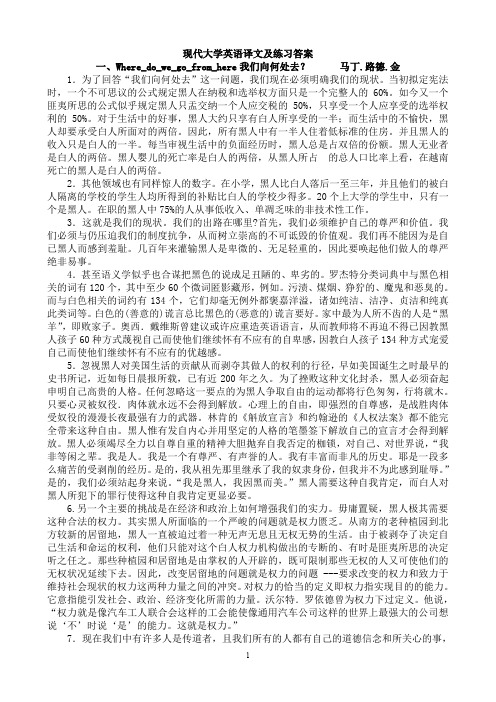
现代大学英语译文及练习答案一、Where_do_we_go_from_here我们向何处去?马丁.路德.金1.为了回答“我们向何处去”这一问题,我们现在必须明确我们的现状。
当初拟定宪法时,一个不可思议的公式规定黑人在纳税和选举权方面只是一个完整人的60%。
如今又一个匪夷所思的公式似乎规定黑人只盂交纳一个人应交税的50%,只享受一个人应享受的选举权利的50%。
对于生活中的好事,黑人大约只享有白人所享受的一半;而生活中的不愉快,黑人却要承受白人所面对的两倍。
因此,所有黑人中有一半人住着低标准的住房。
并且黑人的收入只是白人的一半。
每当审视生活中的负面经历时,黑人总是占双倍的份额。
黑人无业者是白人的两倍。
黑人婴儿的死亡率是白人的两倍,从黑人所占的总人口比率上看,在越南死亡的黑人是白人的两倍。
2.其他领域也有同样惊人的数字。
在小学,黑人比白人落后一至三年,并且他们的被白人隔离的学校的学生人均所得到的补贴比白人的学校少得多。
20个上大学的学生中,只有一个是黑人。
在职的黑人中75%的人从事低收入、单凋乏味的非技术性工作。
3.这就是我们的现状。
我们的出路在哪里?首先,我们必须维护自己的尊严和价值。
我们必须与仍压迫我们的制度抗争,从而树立崇高的不可诋毁的价值观。
我们再不能因为是自已黑人而感到羞耻。
几百年来灌输黑人是卑微的、无足轻重的,因此要唤起他们做人的尊严绝非易事。
4.甚至语义学似乎也合谋把黑色的说成足丑陋的、卑劣的。
罗杰特分类词典中与黑色相关的词有120个,其中至少60个微词匿影藏形,例如。
污渍、煤烟、狰狞的、魔鬼和恶臭的。
而与白色相关的词约有134个,它们却毫无例外都褒嘉洋溢,诸如纯洁、洁净、贞洁和纯真此类词等。
白色的(善意的)谎言总比黑色的(恶意的)谎言要好。
家中最为人所不齿的人是“黑羊”,即败家子。
奥西.戴维斯曾建议或许应重造英语语言,从而教师将不再迫不得已因教黑人孩子60种方式蔑视自己而使他们继续怀有不应有的自卑感,因教白人孩子134种方式宠爱自己而使他们继续怀有不应有的优越感。
大学英语精读第5册课文全文翻译
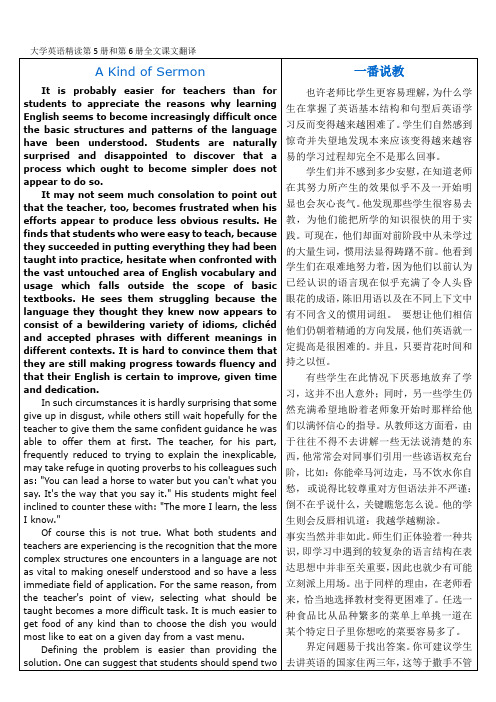
A Kind of Sermon
It is probably easier for teachers than for students to appreciate the reasons why learning English seems to become increasingly difficult once the basic structures and patterns of the language have been understood. Students are naturally surprised and disappointed to discover that a process which ought to become simpler does not appear to do so.
Defining the problem is easier than providing the solution. One can suggest that students should spend two or three years in an English-speaking country, which amounts to washing one's hands of them. Few students have the time or the money to do that. It is often said that wide reading is the time or the money to do that. It is often said that wide reading is the best alternative course of action but even here it is necessary to make some kind of selection. It is no use telling students to go to the library and pick up the first book they come across. My own advice to them would be: "read what you can understand without having to look up words in a dictionary (but not what you can understand at a glance); read what interests you; read what you have time for (magazines and newspapers rather than novels unless you can read the whole novel in a week or so); read the English written today, not 200 years ago; read as much as you can and try to remember the way it was written rather than individual words that puzzled you." And instead of "read", I could just as well say "listen to."
现代大学英语精读5课文翻译。。

.一座孤零零的小山在俄克拉荷马的草原上拔地而起,它的西面和北面是维奇塔山脉。
对于我们克尔瓦人来说,它是个古老的界标,我们给它取名叫雨山。
这里有世界上最恶劣的天气。
冬季有大暴风雪,春季就刮起了飓风,到了夏季,草原热得就像铁砧一样。
草变得又脆又黄。
沿着河流和小溪,是长长的绿带,有一排排的山核桃树、柳树和金缕梅。
从远望去,七八月里的树叶热得冒烟,犹如在火中挣扎。
高高的草地上到处都是大个儿的黄绿色的蚱蜢.像玉米花一样爆裂开,刺得人痛。
乌龟在红土地上爬行,不知要去何处。
寂寞荒凉是这里的一大特点。
草原上的一切都是疏离开来的,所见之物不会混杂在一起让人看不清楚。
要么只是一山,要么只是一树、一人。
清晨,太阳在你的背后冉冉升起,此时观看大地,你会失去平时的比例感。
你会张开想像的翅膀,并认定这就是上帝造设宇宙的起始点。
2.我七月回到了雨山。
我祖母于春季去世,我是想去她的墓地。
她活得很老,最后因虚弱而死。
她死的时候,是她现在惟一活着的女儿陪伴着她。
听说她死时的脸像张孩子的脸。
3.我喜欢把她看作孩子。
她出生时,俄克拉荷马人正生活在其所史上鼎盛时期的最后阶段。
一个多世纪以来,他们掌控着从斯莫克山河到红河那片空旷的山脉,掌控着从加拿大河流的源头到阿肯色河和西马隆河交汇处的地域。
他们与科曼斯人一道,统治着整个南部平原。
发动战争是他们神圣的职责.他们是世人所知的最优秀的骑手。
然而,对于克尔瓦人来说,作战更多是因为这是他们的习惯,而非为了生存。
他们从来都不理解美国骑兵残酷的进攻。
当最后四分五裂、弹尽粮绝时,他们便冒着冰凉的秋雨来到斯代克特平原,陷入了恐慌。
在帕罗多罗坎,他们的弹粮被抢劫一空,只剩下了性命。
为了拯救自己,他们在福特西尔投降,被监禁在一个石头堆砌的牛马棚。
现在,这里已经是个军事博物馆了。
我的祖母得以豁免那高高的灰墙里的羞辱,因为她是在此事件8年或10年后出生的。
但自出生起,她就已经懂得失败给人带来的苦难.这使那些老战士们百思不得其解。
现代大学英语精读5翻译及课后习题答案(5个单元)
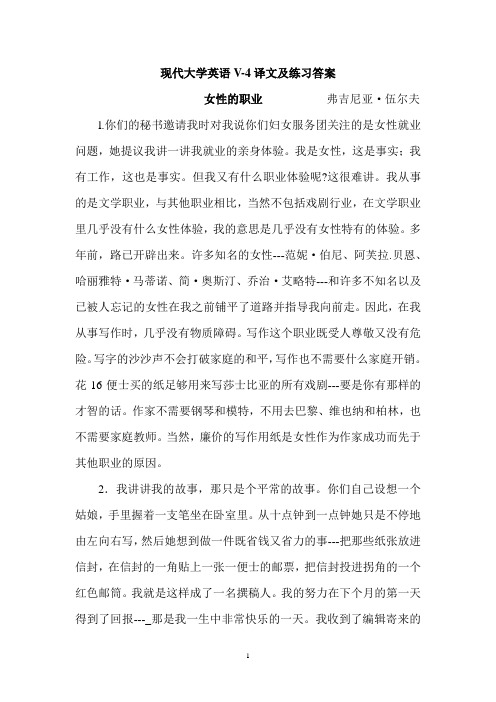
现代大学英语V-4译文及练习答案女性的职业弗吉尼亚·伍尔夫l.你们的秘书邀请我时对我说你们妇女服务团关注的是女性就业问题,她提议我讲一讲我就业的亲身体验。
我是女性,这是事实;我有工作,这也是事实。
但我又有什么职业体验呢?这很难讲。
我从事的是文学职业,与其他职业相比,当然不包括戏剧行业,在文学职业里几乎没有什么女性体验,我的意思是几乎没有女性特有的体验。
多年前,路已开辟出来。
许多知名的女性---范妮·伯尼、阿芙拉.贝恩、哈丽雅特·马蒂诺、简·奥斯汀、乔治·艾略特---和许多不知名以及已被人忘记的女性在我之前铺平了道路并指导我向前走。
因此,在我从事写作时,几乎没有物质障碍。
写作这个职业既受人尊敬又没有危险。
写字的沙沙声不会打破家庭的和平,写作也不需要什么家庭开销。
花16便士买的纸足够用来写莎士比亚的所有戏剧---要是你有那样的才智的话。
作家不需要钢琴和模特,不用去巴黎、维也纳和柏林,也不需要家庭教师。
当然,廉价的写作用纸是女性作为作家成功而先于其他职业的原因。
2.我讲讲我的故事,那只是个平常的故事。
你们自己设想一个姑娘,手里握着一支笔坐在卧室里。
从十点钟到一点钟她只是不停地由左向右写,然后她想到做一件既省钱又省力的事---把那些纸张放进信封,在信封的一角贴上一张一便士的邮票,把信封投进拐角的一个红色邮筒。
我就是这样成了一名撰稿人。
我的努力在下个月的第一天得到了回报---_那是我一生中非常快乐的一天。
我收到了编辑寄来的一封信,里面装有一张一英镑十先令六便士的支票。
为了让你们了解我不值得被称作职业女性,对人生的艰难和奋斗知之甚少,我得承认我没用那笔钱买食物、付房租、买袜子和肉,而是出去买了一只猫,一只漂亮的波斯猫,这只猫不久就引起了我和邻居间的激烈争端。
3.什么会比写文章并用赚得的钱买波斯猫来得更容易?但再想一想,文章得有内容。
我好像记得我的文章是评论一部名人写的小说。
现代大学英语精读5第一课中英文对照

现代大学英语精读5第一课中英文对照Martin Luther King Speech - Where do we go from hereNow, in order to answer the question, "Where do we go from here?" which is our theme, we must first honestly recognize where we are now. When the Constitution was written, a strange formula to determine taxes and representation declared that the Negro was 60 percent of a person. Today another curious formula seems to declare he is 50 percent of a person. Of the good things in life, the Negro has approximately one half those of whites. Of the bad things of life, he has twice those of whites. Thus half of all Negroes live in substandard housing. And Negroes have half the income of whites. When we view the negative experiences of life, the Negro has a double share. There are twice as many unemployed.The rate of infant mortality among Negroes is double that of whites and there are twice as many Negroes dying in Vietnam as whites in proportion to their size in the population.现在,为了回答这个问题,“我们该何去何从呢?”是我们的主题,我们首先必须坦白承认我们现在是在什么地方。
现代大学英语精读5 课文翻译unit1,2,4,5,7
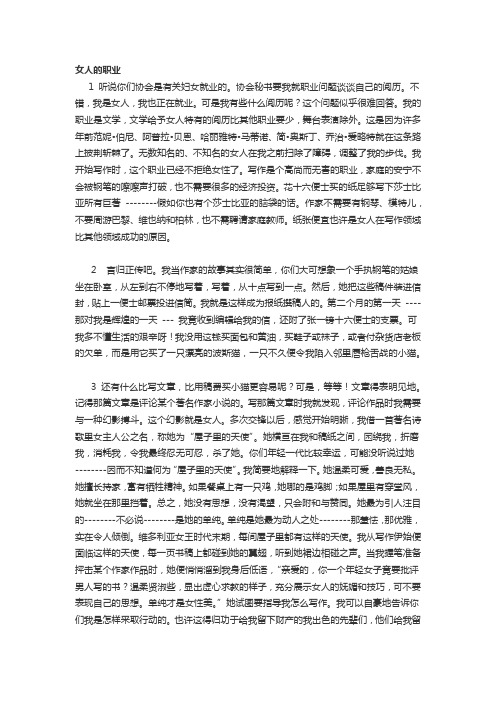
女人的职业1 听说你们协会是有关妇女就业的。
协会秘书要我就职业问题谈谈自己的阅历。
不错,我是女人,我也正在就业。
可是我有些什么阅历呢?这个问题似乎很难回答。
我的职业是文学,文学给予女人特有的阅历比其他职业要少,舞台表演除外。
这是因为许多年前范妮•伯尼、阿普拉•贝恩、哈丽雅特•马蒂诺、简•奥斯丁、乔治•爱略特就在这条路上披荆斩棘了。
无数知名的、不知名的女人在我之前扫除了障碍,调整了我的步伐。
我开始写作时,这个职业已经不拒绝女性了。
写作是个高尚而无害的职业,家庭的安宁不会被钢笔的嚓嚓声打破,也不需要很多的经济投资。
花十六便士买的纸足够写下莎士比亚所有巨著--------假如你也有个莎士比亚的脑袋的话。
作家不需要有钢琴、模特儿,不要周游巴黎、维也纳和柏林,也不需聘请家庭教师。
纸张便宜也许是女人在写作领域比其他领域成功的原因。
2 言归正传吧。
我当作家的故事其实很简单,你们大可想象一个手执钢笔的姑娘坐在卧室,从左到右不停地写着,写着,从十点写到一点。
然后,她把这些稿件装进信封,贴上一便士邮票投进信筒。
我就是这样成为报纸撰稿人的。
第二个月的第一天---- 那对我是辉煌的一天--- 我竟收到编辑给我的信,还附了张一镑十六便士的支票。
可我多不懂生活的艰辛呀!我没用这钱买面包和黄油,买鞋子或袜子,或者付杂货店老板的欠单,而是用它买了一只漂亮的波斯猫,一只不久便令我陷入邻里唇枪舌战的小猫。
3 还有什么比写文章,比用稿费买小猫更容易呢?可是,等等!文章得表明见地。
记得那篇文章是评论某个著名作家小说的。
写那篇文章时我就发现,评论作品时我需要与一种幻影搏斗。
这个幻影就是女人。
多次交锋以后,感觉开始明晰,我借一首著名诗歌里女主人公之名,称她为“屋子里的天使”。
她横亘在我和稿纸之间,困绕我,折磨我,消耗我,令我最终忍无可忍,杀了她。
你们年轻一代比较幸运,可能没听说过她--------因而不知道何为“屋子里的天使”。
我简要地解释一下。
大学英语精读第5册1-5课文全文翻译
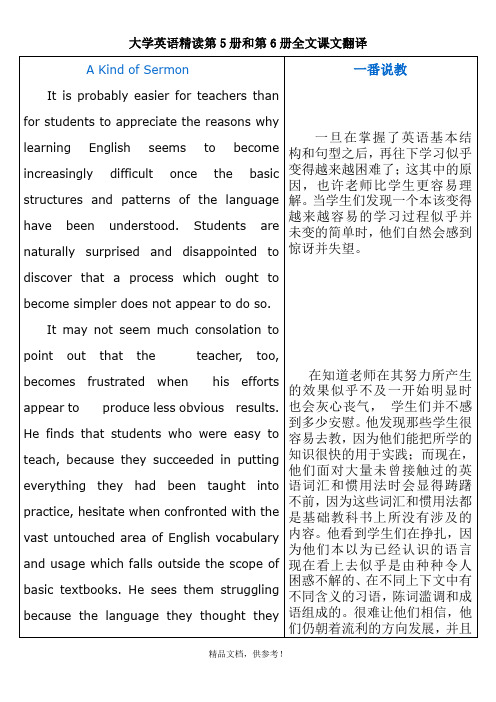
Defining the problem is easier than providing the solution. One can suggest that students should spend two or three years in an English-speaking country, which amounts to washing one's hands of them. Few students have the time or the money to do that. It is often said that wide reading is the time or the money to do that. It is often said that wide reading is the best alternative course of action but even here it is necessary to make some kind of selection. It is no use telling students to go to the library and pick up the first book they come across. My own advice to them would be: "read what you can understand without having to look up words in a dictionary (but not what you can understand at a glance); read what interests you; read what you have time for (magazines and newspapers can read the whole novel in a week or so); read the English written today, not 200 years ago; read as much as you can and try to remember the way it was written rather than individual words that puzzled you." And instead of "read", I could just as well say "listen to."
现代大学英语精读5+全部课文+背景和段落大意
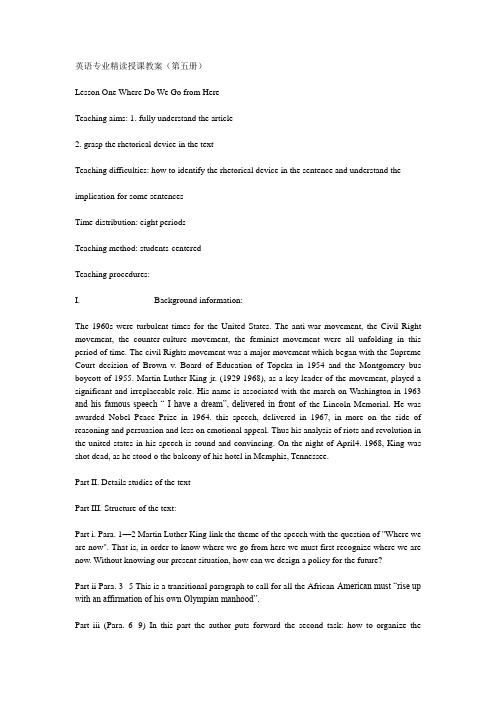
英语专业精读授课教案(第五册)Lesson One Where Do We Go from HereTeaching aims: 1. fully understand the article2. grasp the rhetorical device in the textTeaching difficulties: how to identify the rhetorical device in the sentence and understand theimplication for some sentencesTime distribution: eight periodsTeaching method: students-centeredTeaching procedures:I. Background information:The 1960s were turbulent times for the United States. The anti-war movement, the Civil Right movement, the counter-culture movement, the feminist movement were all unfolding in this period of time. The civil Rights movement was a major movement which began with the Supreme Court decision of Brown v. Board of Education of Topeka in 1954 and the Montgomery bus boycott of 1955. Martin Luther King jr. (1929-1968), as a key leader of the movement, played a significant and irreplaceable role. His name is associated with the march on Washington in 1963 and his famous speech ― I have a dream‖, delivered in front of the Lincoln Memorial. He was awarded Nobel Peace Prize in 1964. this speech, delivered in 1967, in more on the side of reasoning and persuasion and less on emotional appeal. Thus his analysis of riots and revolution in the united states in his speech is sound and convincing. On the night of April4. 1968, King was shot dead, as he stood o the balcony of his hotel in Memphis, Tennessee.Part II. Details studies of the textPart III. Structure of the text:Part i. Para. 1—2 Martin Luther King link the theme of the speech with the question of "Where we are now". That is, in order to know where we go from here we must first recognize where we are now. Without knowing our present situation, how can we design a policy for the future?Part ii Para. 3--5 This is a transitional paragraph to call for all the African-American must ―rise up with an affirmation of his own Olympian manhood‖.Part iii (Para. 6--9) In this part the author puts forward the second task: how to organize thestrength of the Negro in terms of economic and political power. Then the author goes on to define power and points out the consequence of the misinterpretation of power.Part iv (Paras.10--15) This part deals with economic security for the Negro Americans. The speaker advocates guaranteed annual income which he thinks is possible and achievable. He also deals on the advantages of this security.Part v (paras. 16—20) In this part, Martin reaffirms his commitment to nonviolence. He explains why he thinks violence is no solution to racial discrimination. He refutes the idea of Black revolution.Part vi (para 21—25) In this part, Dr. King raises a fundamental question—the restructuring of the whole of American society. He points out that the problem of racism. The problem of economic exploitation and the problem of war are tied together. They are the triple evils of the society.Part vii. (para 26—28) This part serves as the concluding remark for the speech: we shall overcome.Lesson Two Two KindsTeaching aims: 1. fully understand the article2. present their viewpoint on generation gapTeaching difficulties: how to identify the development of a storyTime distribution: eight periodsTeaching method: students-centeredTeaching procedures:Part I. Background information:The Joy Luck Club, from which ―Two Kinds‖ is taken, explores conflicts between two generations and two different cultures. Set in China and in the United States, the novel is woven by stories of four Chinese mothers and their four daughters. Four Chinese women, who have just arrived in the United States and who are drawn together by the shadow of their past—meet in San Francisco to play mah-jongg, eat dim sum and tell stories. They call their gatherings the Joy Luck Club. While they place high hopes on their daughters, the youger generation think of themselves as Americans and resist their mothers’ attempts to change them into obedient Chinese daughters. Only after they have grown up and become more mature do they realize that the legacy left by their mothers is animportant part of their lives, too. The noivel stayed on the best-selling book list of The New York Times for 9 months. A finalist for the national Book Award and the National Book Critics Circle Award, it has been translated into about 20 languages and made into a Hollywood movie.Part II. Detailed Study of the TextPart III. The Structure of the text:Part i (paras.1—3) the beginning part of the story provides the reader with some background information. It tells about the mother and her hopes for her daughter. This paves the way ofr the development of the conflict between the daughter and the mother.Part ii(paras.4—11)this part is about the mother’s unsuccessful attempt to change her daughter into a Chinese Shirley Temple. In the beginning the child was as excited as the mother about becoming a prodigy. At this point, the conflict between mother and daughter was not visible.Part iii(paras12—20) in this part we learn that the mother was trying very hard to train her daughter to be a genius. As the tests got more and more difficult, the daughter lost heart. She decided that she would not let her mother change her. This change of attitudes would lead to the gradual development of the conflict.Part iv (paras 21—28) while watching a Chinese girl playing the piano on an Ed Sullivan Show, a new idea flashed into the mother’s head. With the new plan introduced, the ocnflict would develop further.Part v (paras 29—46) it tells about how the girl was made to learn the piano under the instructions of Old Chong. The relationship between mother and daughter was getting more and more tense.Part vi (para.47—60) Jing-mei was to perform in a talent show held in the church. Jing-mei started all right and soon made a mess of her performance. Undoubtedly this was a heavy blow to her mother. The crisis of the story is about to come.Part vii (para 61—76) the girl assumed that her failure at the show meant she would never have to play the paino. Yet two days later her mother urged her to practice as usual. She refused and the mother insisted. They had the most fierce quarrel they had ever had. This is the crisis or climax of the story.Part viii( 77—93) this concluding part is narrated from a different point of view. Now the daughter had grown up form a little girl to a mature woman.Part IV. Discussion about generation gap.Part V. Complete the exercises of the text.A report about generation gapLesson ThreeGoods Move. People Move. Ideas Move. And Cultures Change.Teaching aims: 1. fully understand the article2. How to develop an argumentTeaching difficulties: how to develop an argumentTime distribution: eight periodsTeaching method: students-centeredTeaching procedures:Part I. Lead-in : Globalization has become one of those words with the highest frequency of appearance but at the same time it is also a most controversial issue in terms of content, implication and consequence. Since the early 1990s, globalization has developed rapidly and brought great changes to the world. However, groups of people for various reasons oppose globalization and point to the negative effects of globalization. So when we face an article of such an important and sensitive issue, we are apt to ask:What is the author’s attitude towards globalization? What makes her adopt such an attitude? How does she present her argument?Part II. Detailed study of the textPart III. Structure of the textPart i (para 1—3) Globalization is a reality but it is not something complietly new. What is new is the speed and scope of changes.Part ii (para 4—6) this part deals with different views on globalization.Part iii (para 7—9) three points are made in this part:a. Westernization is not a straight road to hell, or to paradise either.b. Cultures are as resourceful, resilient, and unpredictable as the people who compose them.c. Teenagers are one of the powerful engines of merging global cultures.Part iv (para 10—13) this part tells of the author’s experience with Amanda Freeman.Part v (para 14—19) in order to prove fusion is the trend, the author used Tom Soper and mah-jongg as an example.Part vi(para 20—24) this part describes the cultural trends in Shanghai.Part viii( para25—28) the author used the experience at Shanghai Theatre Academy to illustrate the point that the change is at the level of ideas.Part ix (para 29—34)the author in this part introduced Toffler’s view on conflict, change and world order.Part x (para35—36)the main idea is there will not be a uniform world culture in the future; the cultures will coexist and transform each other.Part xii(37—39) the author again used an example in Shanghai to illustrate the transformation of culture.Part IV. Complete the exercises in the textbookPart V. collect their viewpoints about attitude towards globalizaion.Lesson FourProfessions for WomenTeaching aims: 1. fully understand the article2. grasp the rhetorical device in the textTeaching difficulties: how to understand the poetic and symbolic sentences in the articleTime distribution: eight periodsTeaching method: students-centeredTeaching procedures:Part I. Background information:Virginia Woolf is generally regarded as one of the greatest writers of modernism as well as one ofthe pioneers of women’s liberat ion from patriarchy. She is known for her experimentation and innovation in novel writing. In her novel, emphasis is on the psychological realm of her characters and the moment-by-moment experience of living, which are depicted by the techniques of interior monologue and stream of consciousness. In this essay, Virginia Woolf gives a clear and convincing presentation of the obstacles facing professional women.Part II. Detailed study of the textPart III. General analysis of the textPara 1: In the profession of literature, the author finds that there are fewer experiences peculiar to women than in other profession because many women writers before her have made the road smooth.Para 2: the author responds to the host’s suggestion that she should tell th e audience something about her own professional experiences. So she now tells her own story –how she became a book reviewer when she was a girl.Para 3.the speaker focuses on the first obstacle to becoming a professional women writer. She uses a figure of speech ―killing the Angel in the House‖ in describing her determination to get rid of the conventional role of women in her writing.Para 4. after the Angel was dead, the question which remains to be answered is ―what is a woman?‖ it is a transitional link between the quthor’s first and second experience.Paragraph 5. In this paragraph the author talks about her second experience in her profession of literature. As a novelist, she wished to remain "as unconscious as possible" so that nothing might disturb or disquiet the imagination. But she was faced with the conflict between her own approach to art and the conventional approach expected of her by male critics. She believed that sex-consciousness was a great hindrance to women's writing. To illustrate this point, she employs a second figure of speech, "the image of a fisherman lying sunk in dreams on the verge of a deep lake."Para 6. This paragraph sums up the author's two experiences, pointing out that the second obstacle is more difficult to overcome than the first. Women have many prejudices to overcome in the profession of literature and especially in new professions that women are entering.Para.7. In this last paragraph Woolf concludes her speech by raising some important questions concerning the new role of women and the new relationship between men and women.Part IV. Complete the exercise of the textPart V. a report on the professional women in ChinaLesson FiveLove Is a FallacyTeaching aims: 1. fully understand the article2. grasp the rhetorical device in the textTeaching difficulties: how to identify the rhetorical device in the sentence and understand theimplication for some sentencesTime distribution: eight periodsTeaching method: students-centeredTeaching procedures:Part I. Lead-in:This is a humorous essay in which the narrator tells his failure to win the heart of a young woman with the force of logic, which therefore proves to him that "love is a fallacy"--"it is inconsistent with logic."Part II. Detailed study of the textPart III. Question on Appreciation:1.How did the narrator describe himself? What does it show? How does the author bring out the pomposity of the narrator? What makes the satire humorous?2.why was the narrator interested in Polly Espy? What kind of girl was she.3. How did the narrator's first date with Polly Espy go?4. How does the language used by Polly strike you? Find some examples from the text and explain what effect her language creates.5. Why did the narrator teach Polly Espy logic? Did he succeed?6. Did the narrator love Polly Espy? How did he try to "acquaint her with his feeling"?7. How did Polly respond to the narrator's arguments for going steady with her? Why did she reject him? What does it show? As the story progresses, Polly turned out to be smarter than thenarrator had previously thought. How does this contrast contribute to the humor of the piece?Part IV complete the exercise in the textLesson SixLife Beyond EarthTeaching aims: 1. fully understand the article2. learn to analyze the textTeaching difficulties: how to learn to analyze the text and understand the implication for some sentencesTime distribution: eight periodsTeaching method: students-centeredTeaching procedures:Part I. General introduction:The author deals with recent developments in the search for alien organisms. He discusses various arguments about alien civilization. He does not think that such belief and search is irrational or even crazy. He writes that most people with such belief ―operate from the same instinct, which is to know the truth about the universe‖. At the same time he maintains a scientific attitude, pointing out that although there are many persuasive arguments, there is still no hard evidence to prove the existence of alien life. Yet he does not stop there. He further points out that since the world we live in—the only inhabitable world in the universe so far—is still far from perfect, people in the world need to direct more energy to making it better. Life on Earth is his greater concern.Part II. Detailed study of the text:Part III. Organization of the piece:1. Analysis of the text:(1) Paras. 1--2 the emergence of life(2) Para. 3 (transition) What else is alive out(3) Paras. 4--10 search for life(4) Paras. 11--23 search for intelligence(5) Paras. 24--42 Mars.(6) Paras. 43--45 Dyson's argument(7) Paras. 46--52 conclusion2. Questions to discuss:1) What do you think of the opening paragraph? Does the author begin the article in a forceful way?2)What role does this paragraph play? What is meant by "the enveloping nebula of uncertainties"? What is the contrast involved as imroduced by "despite"?3) What new idea is introduced in Paras. 17--19?4) Comment on the first sentence in Paragraph 21.5) Comment on the role of Paragraph 35.6) What is the conclusion of the author? What would the author expect of people investigating extraterrestrial life?Lesson SevenInvisible ManTeaching aims: 1. fully understand the article2. grasp the implied meaning of some sentencesTeaching difficulties: how to identify the implied meaning in the sentenceTime distribution: eight periodsTeaching method: students-centeredTeaching procedures:Part I. Background Information:1. about the author2. about the articlePart II. Detailed study of the textPart III. Analysis of the text:Para 1. From this opening paragraph we readers can learn a number of important things:(l) By saying "It goes a long way back, some twenty years," the author tells us that the story took place in the past.(2) The "I' here is the narrator, not the author, of the story, and the author is using the first-person narration in telling the story. As we read On, we will find this narrator is also the main character, the protagonist, of the story.(3) Words like "I was looking for myself" and "I am nobody but myself" point out the central theme of the novel--searching for self-identity.Para. 2 This paragraph tells us a bit about the historical background against place. It also introduces a new character--the narrator's grandfather. On his deathbed, he said something that alarmed and puzzled the whole family.Para 3 This paragraph is about the tremendous effect of the grandfather's words upon the narrator, Those words became a constant puzzle for him. As the old man said these words ironically, the boy couldn't understand him. Although the grandfather did not appear in the battle royal scene or any other events in the rest of the book, his words haunted the narrator at every important moment in his life.Para 4 It tells us about the setting of the battle royal. The narrator was to give his speech at a smoker in a leading hotel in the town. The time is round 1950, the place is a hotel in a Southern town, and the occasion is a gathering of the leading white men of the town. Bearing these in mind will help us readers understand why things happened that way and what was the meaning of all this.Para. 5 Besides giving more details about the place, this paragraph introduces the people involved in the incident the town's big shots, who were "wolfing down the buffet food, drinking beer and whisky and smoking black cigars," and the other black boys who were to take part, who were "tough guys".Para 6 to 9 The main body of the battle royal incident is from Paragraph 4 to paragraph 9. It can be further divided into 4 subsections: the naked white girl's dance; the fight itself; the grabbing for the prize money; the narrator's speech. Paragraphs 6 to 9 form the first subsection in which the author describes the white girl's dance.Paras. 10--28 They form the second subsection of the battle royal incident violent and brutalfight itself. Pay attention to the use of specific words narration realistic and vivid.Paras. 29--46 They describe how the white men further humiliated the black boys even after the battle royal was over. Instead of giving the money the boys were supposed to get for their performance, the white men made fun of them by making them scramble for the money on an electrified rug. This part adds to the general chaos of the whole scene.Para 47--90 They form the last subsection of the whole battle royal incident. In this part the narrator finally got his chance to deliver his well-prepared speech. However, in the middle of his speech, he made a mistake, but everything went well in the end and he was given an award--a scholarship for college.Para. 91—94 They bring the story to a final end. The narrator was overjoyed with his triumph, and that night he dreamed of his grandfather and awoke with the old man’s laughter rining in his ears.Part IV. Complete the exercise in the textPart V. Do some translation work.Lesson EightThe Merely Very GoodTeaching aims: 1. fully understand the article2. grasp the development of the textTeaching difficulties: how to analyze the development of the article and the implied meaning for some sentencesTime distribution: eight periodsTeaching method: students-centeredTeaching procedures:Part I. Information on the author:Jeremy Bernstein(1929- ): professor of physics and writer. After getting his Ph. D. in physics at Harvard, he spent time at the institute for advanced study in Princeton and at the National Science Foundation. He taught physics for 5years at New York University and then at Stevens Institute of Technology, Hoboken, New Jersey.But Jeremy Bernstein has also spent more than 30 years on the staff of The New Yorker magazine, writing mostly about physics, computers, and other topics in physical science. He moves as comfortably among sentences and paragraphs as among equations.Part II. Detailed study of the text:Part III. Questions about the article1. Oppenteimer is called ― Father of the Atomic Bomb‖ and had been in charge of the Los Alamas nuclear laboratory for many years. Yet the author considers him as merely very good. Do you think the author is right and fair in relegating Oppenheimer to the merely very good?2. Do you think it is right to say to be highly focused or not is the cause separating the great ones from the merely very good? What is your view?3. How does the author manage to bring the people he wants to compare into the article?O ppenheimer’s anecdote: Oppenheimer and dirac meetingGottingen, talking about poetry and physicsHis decision to go to the conferenceSpender’s being at the conference—Spende r’s obsession with Auden—great versus merely very good.4.How does the author develop the article?He uses the 1981 conference as the benchmark and goes back to earlier times and in the last two paragraphs returns the scene to the time of writing. This technique of montage is used largely in cinema.For example:The 1981 conference and the author’s indecision—(flashback to 1925—1927) earlier life of Oppenheimer and his relations with Dirac—(back to 1981) the author’s decision: Spender and Auden—(flashback)Spender and Oppenheimer(1956)—(1958)Oppenheimer, Dirac and the author—(back to 1981) meeting with Spender—(bringing the scene to 1996) concluding remarks.Lesson NineThe Way to Rainy MountainTeaching aims: 1. fully understand the article2. grasp the rhetorical device in the textTeaching difficulties: how to identify the rhetorical device in the sentence and understand theimplication for some sentencesTime distribution: eight periodsTeaching method: students-centeredTeaching procedures:Part I. About the AuthorN. Scott Momaday was born in Lawton, Oklahoma in 1934. Momaday belongs to a generation of American Indians born when most tribal communities had long ceased to exist as vital social organizations. His Kiowa ancestors shared with other Plains Indians the horrors of disease, military defeat, and cultural and religious deprivation in the 19th century. Their only chance of survival was to adapt themselves to new circumstances. Momaday’s grandfather, for example, adjusted to changing conditions by taking up farming, a decision pressed upon him by the General Allotment Act of 1887.Part II. Detailed study of the textPart III. The analysis of the textPara 1. the opening paragraph of the essay is a lyrical description of the author’s ancestral land, which plays a key role in his exploration of his Kiowa identity.Para 2. the author explains his purpose of his visit to Rainy Mountain: to be at his grandmother’s grave.Para 3. it sums up the history of the Kiowas as a Plains Native culture—the golden time and the decline in their history.Para 4. it is about how the Kiowas migrated from western Montana and how the migration transformed the Kiowas.Para 5. the author returns to his grandmother again. Since she is the immediate reason for him to come to Rainy Mountain, she is the link between the author and his ancestors.Para 6. The Kiowas felt a sense of confinement in Yellowstone, Montana.Para 7. this paragraph is a depiction of the landscape which they came upon when they got out of the highlands in Montana.Para 8. in this para the author describes Devil’s Tower and tells the Kiowas’s legend about it.Para 9. the author tells about the last days of the Sun Dance culture by using his grandmother as a witness.Para 10. for the first time, the author concentrates only on his grandmother’s story rather than mixing it with the history of the whole Kiowa tribe. Also for the first time, the author shifts the focus of depicting the lanscape to describing a person—his grandmother Aho as an old woman.Para 11—12 paragraph 11 is about the old houses at Rainy Mountain, which the author’s grandmother and other Kiowas used to live in, but which are now empty. This paragraph serves as a transition between the depiction of Grandma Aho and the reunion at her house.Para 11 and 12 describe the reunions that were once held at the grandmother’s house when the author was a child. We can see the author accepts change and loss as facts of life. He neither denies nor defies them. Imagination helps him strike a balance between them. So, after depicting his dead grandmother’s old house, he brings to life the joy and activity that once filled it. As a child Momaday took part in those events. By re-creating those scenes, he reminds himself of who he is.Part IV. Complete the exercise of the text。
现代大学英语精读5(第二版)课文翻译(1-11课)

现代大学英语译文及练习答案一、Where_do_we_go_from_here我们向何处去?马丁.路德.金1.为了回答“我们向何处去”这一问题,我们现在必须明确我们的现状。
当初拟定宪法时,一个不可思议的公式规定黑人在纳税和选举权方面只是一个完整人的60%。
如今又一个匪夷所思的公式似乎规定黑人只盂交纳一个人应交税的50%,只享受一个人应享受的选举权利的50%。
对于生活中的好事,黑人大约只享有白人所享受的一半;而生活中的不愉快,黑人却要承受白人所面对的两倍。
因此,所有黑人中有一半人住着低标准的住房。
并且黑人的收入只是白人的一半。
每当审视生活中的负面经历时,黑人总是占双倍的份额。
黑人无业者是白人的两倍。
黑人婴儿的死亡率是白人的两倍,从黑人所占的总人口比率上看,在越南死亡的黑人是白人的两倍。
2.其他领域也有同样惊人的数字。
在小学,黑人比白人落后一至三年,并且他们的被白人隔离的学校的学生人均所得到的补贴比白人的学校少得多。
20个上大学的学生中,只有一个是黑人。
在职的黑人中75%的人从事低收入、单凋乏味的非技术性工作。
3.这就是我们的现状。
我们的出路在哪里?首先,我们必须维护自己的尊严和价值。
我们必须与仍压迫我们的制度抗争,从而树立崇高的不可诋毁的价值观。
我们再不能因为是自已黑人而感到羞耻。
几百年来灌输黑人是卑微的、无足轻重的,因此要唤起他们做人的尊严绝非易事。
4.甚至语义学似乎也合谋把黑色的说成足丑陋的、卑劣的。
罗杰特分类词典中与黑色相关的词有120个,其中至少60个微词匿影藏形,例如。
污渍、煤烟、狰狞的、魔鬼和恶臭的。
而与白色相关的词约有134个,它们却毫无例外都褒嘉洋溢,诸如纯洁、洁净、贞洁和纯真此类词等。
白色的(善意的)谎言总比黑色的(恶意的)谎言要好。
家中最为人所不齿的人是“黑羊”,即败家子。
奥西.戴维斯曾建议或许应重造英语语言,从而教师将不再迫不得已因教黑人孩子60种方式蔑视自己而使他们继续怀有不应有的自卑感,因教白人孩子134种方式宠爱自己而使他们继续怀有不应有的优越感。
大学英语精读第5册全文翻译
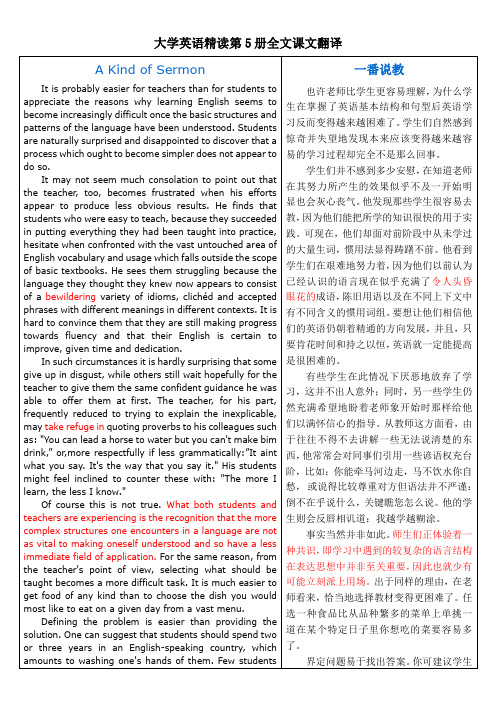
大学英语精读第5册课文全文翻译

大学英语精读第5册和第6册全文课文翻译
A Kind of Sermon
It is probably easier for teachers than for students to appreciate the reasons why learning English seems to become increasingly difficult once the basic structures and patterns of the language have been understood. Students are naturally surprised and disappointed to discover that a process which ought to become simpler does not appear to do so.
It may not seem much consolation to point out that the teacher, too, becomes frustrated when his efforts appear to produce less obvious results. He finds that students who were easy to teach, because they succeeded in putting everything they had been taught into practice, hesitate when confronted with the vast untouched area of English vocabulary and usage which falls outside the scope of basic textbooks. He sees them struggling because the language they thought they knew now appears to consist of clichéd and accepted phrases with different meanings in different contexts. It is hard to convince them that they are still making progress towards fluency and that their English is certain to improve, given time and dedication.
现代大学英语精读5翻译
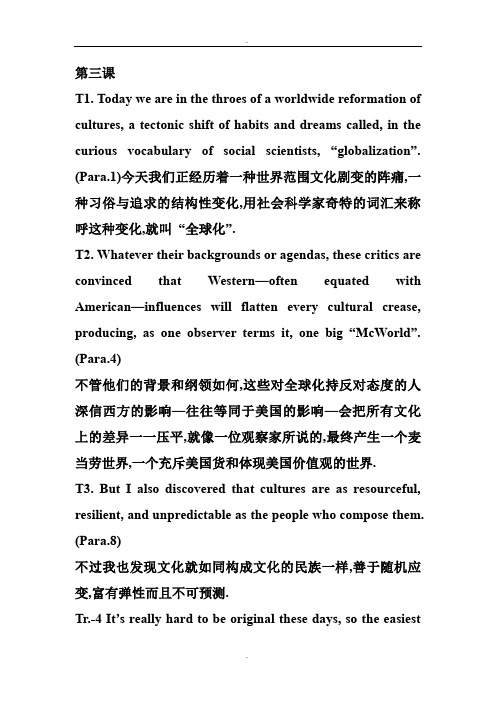
第三课T1. Today we are in the throes of a worldwide reformation of cultures, a tectonic shift of habits and dreams called, in the curious vocabulary of social scientists, “globalization”. (Para.1)今天我们正经历着一种世界范围文化剧变的阵痛,一种习俗与追求的结构性变化,用社会科学家奇特的词汇来称呼这种变化,就叫“全球化”.T2. Whatever their backgrounds or agendas, these critics are convinced that Western—often equated with American—influences will flatten every cultural crease, producing, as one observer terms it, one big “McWorld”. (Para.4)不管他们的背景和纲领如何,这些对全球化持反对态度的人深信西方的影响—往往等同于美国的影响—会把所有文化上的差异一一压平,就像一位观察家所说的,最终产生一个麦当劳世界,一个充斥美国货和体现美国价值观的世界.T3. But I also discovered that cultures are as resourceful, resilient, and unpredictable as the people who compose them. (Para.8)不过我也发现文化就如同构成文化的民族一样,善于随机应变,富有弹性而且不可预测.Tr.-4 It’s really hard to be original these days, so the easiestway to come up with new stuff is to mix things that already exist. (Para.13)现今创新极为困难。
现代大学英语精读5课后翻译
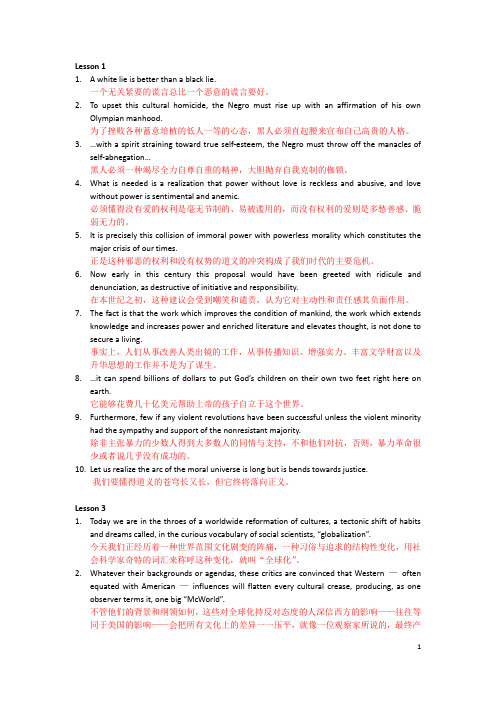
Lesson 11. A white lie is better than a black lie.一个无关紧要的谎言总比一个恶意的谎言要好。
2.To upset this cultural homicide, the Negro must rise up with an affirmation of his ownOlympian manhood.为了挫败各种蓄意培植的低人一等的心态,黑人必须直起腰来宣布自己高贵的人格。
3.…with a spirit straining toward true self-esteem, the Negro must throw off the manacles ofself-abnegation…黑人必须一种竭尽全力自尊自重的精神,大胆抛弃自我克制的枷锁。
4.What is needed is a realization that power without love is reckless and abusive, and lovewithout power is sentimental and anemic.必须懂得没有爱的权利是毫无节制的、易被滥用的,而没有权利的爱则是多愁善感、脆弱无力的。
5.It is precisely this collision of immoral power with powerless morality which constitutes themajor crisis of our times.正是这种邪恶的权利和没有权势的道义的冲突构成了我们时代的主要危机。
6.Now early in this century this proposal would have been greeted with ridicule anddenunciation, as destructive of initiative and responsibility.在本世纪之初,这种建议会受到嘲笑和谴责,认为它对主动性和责任感其负面作用。
现代大学英语精读5课后翻译

Lesson 11. A white lie is better than a black lie.一个无关紧要的谎言总比一个恶意的谎言要好。
2.To upset this cultural homicide, the Negro must rise up with an affirmation of his ownOlympian manhood.为了挫败各种蓄意培植的低人一等的心态,黑人必须直起腰来宣布自己高贵的人格。
3.…with a spirit straining toward true self-esteem, the Negro must throw off the manacles ofself-abnegation…黑人必须一种竭尽全力自尊自重的精神,大胆抛弃自我克制的枷锁。
4.What is needed is a realization that power without love is reckless and abusive, and lovewithout power is sentimental and anemic.必须懂得没有爱的权利是毫无节制的、易被滥用的,而没有权利的爱则是多愁善感、脆弱无力的。
5.It is precisely this collision of immoral power with powerless morality which constitutes themajor crisis of our times.正是这种邪恶的权利和没有权势的道义的冲突构成了我们时代的主要危机。
6.Now early in this century this proposal would have been greeted with ridicule anddenunciation, as destructive of initiative and responsibility.在本世纪之初,这种建议会受到嘲笑和谴责,认为它对主动性和责任感其负面作用。
- 1、下载文档前请自行甄别文档内容的完整性,平台不提供额外的编辑、内容补充、找答案等附加服务。
- 2、"仅部分预览"的文档,不可在线预览部分如存在完整性等问题,可反馈申请退款(可完整预览的文档不适用该条件!)。
- 3、如文档侵犯您的权益,请联系客服反馈,我们会尽快为您处理(人工客服工作时间:9:00-18:30)。
现代大学英语精读5
课文翻译
u n i t1,2,4,5,7
女人的职业
1 听说你们协会是有关妇女就业的。
协会秘书要我就职业问题谈谈自己的阅历。
不错,我是女人,我也正在就业。
可是我有些什么阅历呢?这个问题似乎很难回答。
我的职业是文学,文学给予女人特有的阅历比其他职业要少,舞台表演除外。
这是因为许多年前范妮•伯尼、阿普拉•贝恩、哈丽雅特•马蒂诺、简•奥斯丁、乔治•爱略特就在这条路上披荆斩棘了。
无数知名的、不知名的女人在我之前扫除了障碍,调整了我的步伐。
我开始写作时,这个职业已经不拒绝女性了。
写作是个高尚而无害的职业,家庭的安宁不会被钢笔的嚓嚓声打破,也不需要很多的经济投资。
花十六便士买的纸足够写下莎士比亚所有巨著 --------假如你也有个莎士比亚的脑袋的话。
作家不需要有钢琴、模特儿,不要周游巴黎、维也纳和柏林,也不需聘请家庭教师。
纸张便宜也许是女人在写作领域比其他领域成功的原因。
2 言归正传吧。
我当作家的故事其实很简单,你们大可想象一个手执钢笔的姑娘坐在卧室,从左到右不停地写着,写着,从十点写到一点。
然后,她把这些稿件装进信封,贴上一便士邮票投进信筒。
我就是这样成为报纸撰稿人的。
第二个月的第一天 ---- 那对我是辉煌的一天 --- 我竟收到编辑给我的信,还附了张一镑十六便士的支票。
可我多不懂生活的艰辛呀!我没用这钱买面包和黄油,买鞋子或袜子,或者付杂货店老板的欠单,而是用它买了一只漂亮的波斯猫,一只不久便令我陷入邻里唇枪舌战的小猫。
3 还有什么比写文章,比用稿费买小猫更容易呢?可是,等等!文章得表明见地。
记得那篇文章是评论某个著名作家小说的。
写那篇文章时我就发现,评论作品时我需要与一种幻影搏斗。
这个幻影就是女人。
多次交锋以后,感觉开始明晰,我借一首著名诗歌里女主人公之名,称她为“屋子里的天使”。
她横亘在我和稿纸之间,困绕我,折磨我,消耗我,令我最终忍无可忍,杀了她。
你们年轻一代比较幸运,可能没听说过她--------因而不知道何为“屋子里的天使”。
我简要地解释一下。
她温柔可爱,善良无私。
她擅长持家,富有牺牲精神。
如果餐桌上有一只鸡,她哪的是鸡脚;如果屋里有穿堂风,她就坐在那里挡着。
总之,她没有思想,没有渴望,只会附和与赞同。
她最为引人注目的--------不必说--------是她的单纯。
单纯是她最为动人之处--------那羞怯,那优雅,实在令人倾倒。
维多利亚女王时代末期,每间屋子里都有这样的天使。
我从写作伊始便面临这样的天使,每一页书稿上都碰到她的翼翅,听到她裙边相碰之声。
当我握笔准备抨击某个作家作品时,她便悄悄溜到我身后低语,“亲爱的,你一个年轻女子竟要批评男人写的书?温柔贤淑些,显出虚心求教的样子,充分展示女人的妩媚和技巧,可不要表现自己的思想。
单纯才是女性美。
”她试图要指
导我怎么写作。
我可以自豪地告诉你们我是怎样采取行动的。
也许这得归功于给我留下财产的我出色的先辈们,他们给我留下了一定数量的金钱--------也许每年五百镑,它让我能不靠美貌可爱过活。
我转过身,扼住她的喉咙用力杀死她。
假如我被押上法庭,我的借口是:我是在进行正当防卫。
我不杀她,她会杀我,她要抽掉我作品的精神。
没有思想,我怎么表现自己对人性、道德和性别的理解?而“屋子里的天使”们声称女人是不该公开讨论这些问题的。
她们要的是可爱、迷人,想成功还得说谎--------说得粗鲁些。
我一发现书桌上有她们羽翼的阴影或晕圈的光辉,就拿起墨水瓶向她们投去。
上的,扼死她并不容易,她温柔可爱的外表极富欺骗性;而扼死假象中的幻影比扼死真实中的存在更困难。
每每我要与其搏斗时,它便隐退了。
虽然我自以为我终于杀死了她,但这场搏斗确实惊心动魄,其耗时不亚于学希腊语法,或进行漫游世界的探险。
这便是我同时代女作家无从避免的经历。
杀死“屋子里的天使”是女作家的职业组成部分之一。
4 继续说我自己的故事。
天使死了,剩下什么?你会说,当然是静坐桌前的年轻女性了。
换句话说,既然她已排除了幻影,她当然成为独立的自己了。
那么,“她自己”,即女人,又是什么呢?我不知道,我想你们也不知道。
任何女人在没从事人类所有艺术与职业之前是没法表达清楚“女人”的定义的。
这便是我出于对你们的尊敬来这里的原因。
你们正在以你们的经历,以你们的失败和成功,向人们说明着女人是什么,为人们提供尤为重要的信息。
5 言归正传。
继续说说我的职业经历。
第一次书评赚的一镑十六便士买了波斯猫。
以后,我胃口越来越大。
波斯猫虽好,可远远不够。
我还想要摩托车。
这样,我便做了小说家---------你给别人讲故事,别人给你摩托车,这是很奇妙的事。
更奇妙的是,世界上再没有比讲故事更令人高兴的事了。
它比写书评快乐多了。
遵照你们秘书的指示,我得说一说我作为小说家的职业经历。
这是一种很奇特的经历,你们得充分想象小说家的思想状态才能理解。
我希望我在这里没有泄露职业机密。
小说家的最大愿望是尽量做到无意识,创造一个永久平静的内心世界。
他希望生活平静而有规律,没有异常事情打搅和干扰。
当他写作时,他要求看到同样的面孔,阅读同样的书,做同样的事,一天接一天,一个月接一个月,这样便不会破坏他沉浸其中的幻象,不会扰乱他想象力的探索、感觉、冲击和实现。
这种思想状态对男性作家和女性作家都是一样的。
尽管如此,我还是想说我是在恍惚中创造小说的,你们大可想象,一位手握笔杆的女孩在屋里连续坐几个小时,也不见把笔往墨水瓶里蘸一下。
这情景绝象湖边神情专注的钓鱼翁。
她在让想象力如奔腾的江水扫过沉寂在无意识深处每一块岩石,每一道缝隙。
下面的经历我想或许对女作家比读男作家更为普遍。
当她文思
泉涌,想象力找到了蓄集处,寻到水底深处静眠的大鱼时,便妙笔生花,一行行文字跃然纸上。
一次次碰撞,一回回爆发,溅起泡沫,翻起浪花。
当想象力撞到某个硬物时,女孩从梦幻中惊醒。
此刻她处于极度的痛苦与矛盾之中,无庸置疑,她强烈感受到的身心体验是不适合作她为女人表现出来的。
理智告诉她男人会怎么评论一个倾吐自己真实情感的女人。
这惊醒了她艺术家的无意识。
她无法继续写下去。
恍惚荡涤殆尽,想象力无以为继。
我相信女作家都会有这样的体验--------她们被男作家创作的极端俗套阻碍了。
在这方面男人们虽然明达地给予自己极大的自由,却极其严厉地责难女人身上的这种自由,而且还没有意识到自己的严厉,更不用说去控制这种严厉了。
6这就是我的两个亲身经历,这就是我职业生活的两大历险。
杀死“屋子里的天使”,这个问题我想我已经解决了,天使死了。
但写出自己作为人的真正感受和体验,这第二个问题还尚待解决。
我想还没有任何女人已经解决了这个问题。
防碍她的阻力依然很大--------然而它们又是很难以接定。
表面上看,难道还有什么比写书更容易的吗?实际上,情况完全不同,她要和许多魔鬼搏斗,要克服无数偏见。
女人写作不必杀死幻影、跨越障碍的时代依然遥远得很。
如果文学这个所有职业中之于女人最自由的职业尚且如此,那么女人第一次进入的全新职业又将如何呢?
7假如有时间,这是我要问你们的问题。
我之所以强调了我的职业经历,是因为我觉得它一定也是你们的经历,也许表现形式不同而已。
即便职业的大门已向妇女敞开,女人不再被拒绝做医生、律师、公务员,幻影和阻力依然在向她逼近。
我以为讨论和界定这幻影和阻力很有必要。
只有这样,才能分享劳动,解决难题。
此外我们还要弄清我们奋斗的目的,我们超越阻力的目的是什么。
我们当然不能想当然,我们必须不断质疑和探讨。
在座的诸位从事各种各样的职业,起多样性是有史以来空前的,其重要性是无可比拟的。
你们已在一直被男人独占的屋子里赢得了自己的房间。
你们靠自己劳动和努力交了房租。
你们靠自己每年赚五百英镑。
这只是刚刚开始。
房间是自己的了,可它依然空空的,它需要装潢修饰,需要与人共享。
怎么修饰?与谁共享?基于什么样的条件?这些,我认为都是些极其重要和有趣的问题。
有史以来你们第一次可以提出这样的问题,也能够决定自己的答案了。
我很愿意留下来讨论这些问题,但不是今晚。
因为时间的关系,我就此打住。
